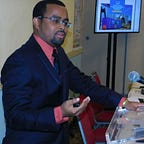IT MATTERS!- Why Practicing Impromptu Speaking is Important…
Hello Readers. In the last blog, I shared that I had been trying to develop a purposeful and intentional way of overcoming the challenges I faced with impromptu speaking. I had also shared there was one important, overarching reason not to avoid Table Topics ® but did not reveal what that reason was. So before I jump into the “how” I eventually improved, let me share a little on “why” this issue is relevant (don’t you just hate when people do that?…unnecessary suspense 😁).
There are several people (the average employee, practicing speakers, professional speakers…) who are relatively comfortable when presenting a prepared speech. I’m speaking about being given a week to prepare that ‘Vote of Thanks’ to be delivered at the end of your company’s event, or that toast at your brother’s wedding. But the fact is that although public speaking in general can be viewed as difficult, it sure as hell (-ish), is a lot easier to do when you know ahead of time what you will need to talk about… and have at least penned down how you might plan to say it. Your only uncertainty in that situation is the choice between reading your written speech, swatting it or some skillful hybrid of the two.
For this reason, even a survey taken at one of the best Toastmaster® Clubs in the Caribbean (arguably the world…) revealed that some members (despite being excellent presenters of planned/rehearsed speeches) were still not very comfortable with impromptu speaking in particular (see Figure below). We can imagine, then, that these findings can be extrapolated (in a very exponential way…) to the average person (non-Toastmasters®) who do not practice public speaking at all, whether planned or off-the-cuff.
And why do people fear impromptu speaking??? Well fret not, as your resident researcher and Engineer, I was sure to ask that question as well (See the figure below). It seems that people largely dislike or fear the uncertainty of what will be asked (which can lead to them feeling foolish), an inability to think on their feet to be creative or entertaining (which can lead to them feeling foolish),or not being able to answer coherently resulting in babbling (which also can lead to…well, I think you get the point).
The figure above speaks about Table Topics® and much of this blog will also appear to be centered around it. However, Readers,…even if you are not a Toastmaster®, it is very important to know that impromptu speaking scenarios can disguise themselves in many sneaky forms in real-life situations:
· Job Interview
· Radio interview
· TV Interview
· A panelist discussion (Q & A)
· Your boss asks you to explain something in a meeting.
· You are having an intense discussion with friends or in any group where your ability to make a point in a normal discussion determines social status (yes, this happens).
All these are examples of real-life situations where you frequently use impromptu speaking daily. The group that was surveyed seemed to agree:
It stands to reason then, that all the approaches, findings and experiences shared here will be (I believe) applicable and valuable to Toastmasters® and non-Toastmasters® alike. It is against this backdrop that I decided something had to be done, no matter how long it took me to do so…and no matter how uncomfortable it made me. Stand by for blog #3 in this series where I will tell you about the details of the ON-THE-SPOT program. See you in 4 days!
(Click HERE to see Blog #3-the next blog in the series)
(Click HERE to see Blog #1-the previous blog)
